Walkabout, or, Lessons from the Land
I was forty-five years old. I’d been in my job for six years. During the last four, the environment had become so toxic I began to suffer from consistent anxiety and migraines even during my time away from work. I was miserable, but my attempts to find another job or get out of the situation had all resulted in dead ends. Then I began to daydream of escaping, of running away from New Orleans to the woods, to the mountains. To go on a walkabout. Alone. And come back cleansed.
I’d reached the point where I had to choose between sanity and security. I realized my sanity and happiness had been closely tied to nature since I was seven years old, when I’d had the great luck to live in a rural area lush with trees that flanked a long gravel road leading to our singular trailer, surrounding it and creating a huge carpet of dappled sunlight that unfolded across the driveway, down the yard, rolling all the way to the bank of the nearby Amite River. During this bucolic time in Greenwell Springs, Louisiana, my family managed a horse stable, and when I got home from school each day, I would explore the landscape with a pack of friendly dogs. This was one of my many temporary childhood homes, but this one became a touchstone of joy in a youth defined by frequent moves and long periods of loneliness as an only child and the perpetual new kid in town. When we were flooded out of Greenwell Springs due to the rising river, no place felt like home for a very long time afterward.
Because the toxic job provided a decent salary and security, the idea of willingly walking away (especially at my age) terrified me. How would I pay my bills or keep my apartment without an income? Would I find a job when I got back? I’d just gotten myself out of credit card debt, still had a fat student loan to pay off, had built up a burgeoning savings account, and been able to buy a reliable car for the first time in my life. I felt like I was finally getting somewhere. But was I really getting somewhere if I was steadily sinking into a morass of depression and feeling hopeless on a daily basis?
Why not take a risk? I asked myself. What, really, are you losing? Could you actually gain something by leaving? Do you want to live your whole life never doing what you want to do because you’re afraid? So, after a bit of deliberation and a call to my aunt to make sure I could crash in her basement if I discovered that I’d royally screwed up, I quit my job. I felt more elation in the following weeks than I had in the past four years.
Whether or not you believe Joseph Campbell was right when he stated that once someone follows their bliss, doors they never knew existed will open to them, I’m here to tell you that it certainly began to happen for me once I’d committed myself to the task. Serendipitously, a musician friend had posted on Facebook that he needed a place in New Orleans for a couple of months while he worked on an album; I messaged him about my place, and we came up with a perfect solution for both of us. Seemingly, without effort, help had made itself available. A door had opened. As I packed up and headed to Austin to catch up with generous friends who’d offered their home as one of my first stops, I felt that I had learned the first lesson of my journey.
Lesson #1. Believe that good things will happen to you and make room for them.
***
My first camping experience in the mountains was at the Guadalupe Mountains National Park, not far from El Paso, Texas. I arrived about an hour before dusk on a blustery afternoon; the only camping spot left had just recently been made available by a couple who couldn’t pitch their tent in the windy conditions. Well, I’d felt like an expert after my first day camping in Balmorhea State Park, a lovely place with gorgeously appointed natural springs to swim in alongside the fish and natural flora. I’d almost lost my tent to the wind just that morning, as I’d made the novice mistake of unstaking all corners before bringing the poles down and had to chase my temporary home in flip flops as it rolled over on itself like a tumbleweed, heading toward a barbed-wire fence. I caught it a foot from the fence, breathless with laughter.
The Guadalupe campground had heavy stones readily available to secure the edges of my tent. This gift was given to me. What I didn’t have at that moment was the confidence to hike alone the next morning in bobcat country. While I began my journey as a relatively inexperienced hiker, by the end of my journey, before I set out on a new path, I was able to visualize what I would do if I encountered a rattlesnake or a wolf. A hiker is frequently warned about these dangers at the head of a trail, as I was while on a trip in New Mexico at the Aguirre Spring Campground—a hotbed for rattlesnakes—or in the Gila National Forest at Purgatory Chasm—a spot for denning wolves during the spring. With that visualization (avoid the snake entirely if possible, quietly retreat from the wolf), I had the confidence to journey forth. And on some of those trails, I was very literally the only human on the path. Though that was mostly the case, by the end of the trip I was no longer frightened by the solitude. I had gained the confidence to prepare myself for whatever came along. If I encountered a creature I didn’t want to disturb (which I was lucky enough not to do), or felt I was heading the wrong way (which I did at times), or missed a trail marker (which I did more than I’d wished to), I would get nervous, retrace my steps, and generally see a turn on the path that revealed an entirely new and different landscape, including meadows, caves, cliff dwellings, wide vistas. These kinds of opportunities led me to another lesson.
Lesson #2. Trust your instincts; use anxiety as a message telling you to listen to yourself when you encounter certain types of risks or new situations. If I felt any anxiety, I said no to one option, because there was usually another option that would feel comfortable. Every choice was mine to make. Every responsibility was mine to take on.
***
As I traveled farther west to New Mexico and Arizona, then north to Utah, the landscape began to transform: earth stretched out like a length of dusty taffy punctuated by scrubby trees, erupting with towering rock formations and wide vistas, layers deep—colored in misty purples, mellow blues, rusty oranges, and golden coppers. Each mountain’s majesty towered over you, and you felt no larger than an ant crawling below its grandeur.
Lesson #3. You are small, and consider that smallness a blessing. If I am this small in the scheme of the landscape, I reasoned, then so are my problems. What made these mythical landforms in the first place? Turmoil. Destruction. Transformation. If the eruptions in my personal life are able to create something as beautiful as a mountain range in the end, then I’ve had a successful and magical experience, and I have much to be grateful for, I concluded. This lesson was learned several times—generally each time I camped and woke up to see the unimaginable beauty around me once I stepped outside my tent.
***
I was told there is a belief in Taos, New Mexico, which lies beneath Taos Mountain in the Sangre de Cristo Mountain Range, that when you have a good experience or good luck in that area “the mountain is smiling upon you.” Those who’ve felt that smile fall in love with the land and the place and feel love reflected back by the landscape, as I did. I was told by more than one citizen of the area that the mountain was smiling upon me and that I would be back. I accepted this statement as fact.
I visited the town twice during my journey—once toward the outset and once toward the return home. Each time, I stayed in a vintage trailer park located down US-64 from the Earthships (fully sustainable earthen homes that pop up along the flat, deserted mesa like extraterrestrial dwellings abandoned on Earth) and Taos Mesa Brewing (a brew pub hosting a radio station run out of an Airstream and an Earthship-style bandshell hosting indie performers from across the world).
- My camper home in the trailer park in Taos
- Earthships
- Carson views
I felt as though that mountain was smiling upon me as I drove through the snow-covered roads from Colorado down to Taos; on that drive, the temperature went from 70 to 40 degrees and back again. The roads were plowed of the heavier snow and only flurries fell. My car performed well up and down the switchbacks. There was no ice.
It smiled upon me as I hiked in the Carson National Forest and got directions and trail advice from a friendly woman hiking on the trail with her dogs (she invited me to visit with her when I returned), then ran across a sweet family from Iowa who were visiting and considering a move. The couple’s daughter, a five-year-old junior ranger named Gwinna, generously donated tissues and a peanut butter pretzel (and her love!) for my strenuous hike back down.
Lesson #4. I am never alone if I’m not afraid to ask questions, accept the kindness of others, be humble, and listen, either to the land, the weather, or the people around me. Don’t waste time with people or situations that don’t fulfill you. There is a difference between something being difficult and worth the effort (such as a long hike up to a mountain vista) and something that is difficult because it is not right for you in the moment (such as trekking down a muddy, unkempt path with broken fences and barriers that you discover are under repair, have no view to offer, and could prove to be unsafe). Asking for help, trusting your instincts, and ignoring your ego can keep you on the right path in any situation. Refer back to Lesson #2.
***
I learned to love this varying landscape we are lucky enough to have in the southern United States, easterly and westerly, and to feel kinship with it while respecting its power. If you don’t play by its rules, you won’t survive. Protect yourself from the sun and the cold. If it’s too cold or rainy to camp, get a room somewhere. Rooms are usually available and can be affordable. You may even make new friends.
The Gila National Forest encompasses the first designated wilderness area in the United States (1924) and boasts 558 acres of preserved wild habitat. In the days I was there, I had no cell service, and it was an hour’s drive to get supplies, so a lot of my discoveries were found by simply exploring. I found a camping spot overlooking the crystal blue, pine-ringed Lake Roberts. That night, I had a relaxing fire and enjoyed the flight of various birds as the sun set behind a tiered backdrop of trees. The next morning, I set out for my hike in Purgatory Chasm, just across the way—a deserted trail filled with dried riverbeds and magical rock formations. When I returned, the camp host informed me that my fire had been reignited by the wind—despite it appearing to be fully extinguished the night before after I’d used a full gallon of water to douse it. He and his wife had extinguished the flame for me. After a heavy dose of humility and embarrassed apologies, I made sure I had all the information necessary to guarantee this wouldn’t happen again.
Moving farther south, toward the end of my journey, I put my stakes down at Aguirre Spring Campground, near Las Cruces, New Mexico, under the shadow of three toothy peaks I’d been admiring from the road for at least a mile or more out. Once I’d set up camp, I headed to nearby White Sands National Monument and trekked the snowy dunes for the afternoon. Incredibly, White Sands has the largest collection of gypsum sand outside of the surface of Mars! And it’s an incredible substance—despite the desert temperatures and consistent sun, the sand never gets hot. That afternoon, the wind was so high and the sand so cool that I hadn’t realized I’d become dehydrated until I got back to camp. Luckily, I had all of the makings of a handmade electrolyte drink to bring myself back to health—fresh water, citrus, salt, and sugar.
These experiences taught me my next lesson.
Lesson #5. Nature doesn’t play! So don’t play with nature. It is older and wiser than you are. Learn from it. Though I’d learned on this trip that I was capable and able to use my resources to safely make my way, I made mistakes. I learned to respect the power of nature and to realize that if I did not hold up my part of the bargain and be thorough with my actions toward it, I could damage it, myself, and others.
***
Packing up in enough time to make the next destination and planning each stop, making sure you have backup if your lights die or cell service disappears, ensuring you have enough food and gas for the journey and that your car is in good working order, these activities sometimes felt small and took more energy than I expected but were imperative to ensure smooth and safe travel. And, being a natural procrastinator, I had to adjust my slow pace to take care of responsibilities, bad weather, and various issues in a timely manner. I learned a bit of discipline and the importance of addressing issues as they arose.
Lesson #6. Act when you need to act. Do not let things, feelings, or responsibilities linger or fester. Simplify your life by taking care of immediate needs immediately. Do not hesitate. Act swiftly. By tackling what is in front of you now, you make room for other things. I don’t know that I’ve always behaved in this way since my return from this journey, but the lesson is still there, encouraging me to clear my surroundings, my head, and my heart.
***
In the two years since my return, I’ve realized that I will always need to have an open line of communication to nature, even if it only materializes through making my backyard in the city as lush as possible so I can be in the presence of plants and trees on a daily basis. Surprisingly, that has really helped. I did find employment when I returned, though it took a while to land the job I really wanted—but I did it! Stroke of luck? Trying to practice the lessons above? I’m not sure, but I am sure that taking this risk was one of the best decisions I’ve ever made. It’s made me more present and more appreciative of my surroundings and for the things and people that populate this beautifully small life I have. Doors have continued to open, though I’ll admit, sometimes it takes some time.
Every day, I realize how lucky I am to share space with this land; I’m grateful for the National Parks system and all of its workers, without whom my journey would not have been possible. They made wilderness, which can be inhospitable, accessible to an inexperienced hiker. That gift changed my worldview and provided me with my final great lesson.
Lesson #7. Be grateful and you will continue to be the recipient of gifts. The trouble can be remembering that. So when you find yourself forgetting, get out among something bigger, older, and wiser than yourself and let yourself feel small. See what it does for you. You may be surprised.
*All photos by the author


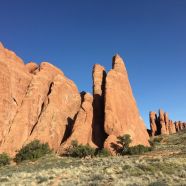





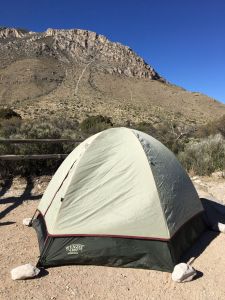
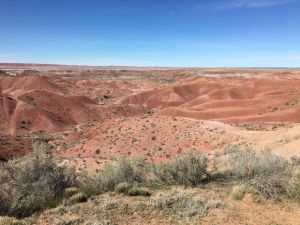
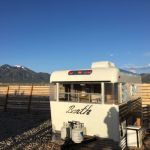
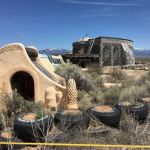
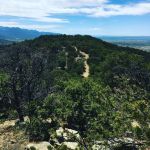
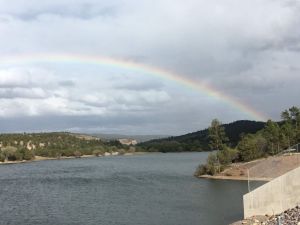
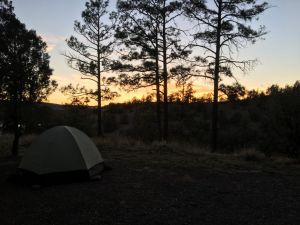
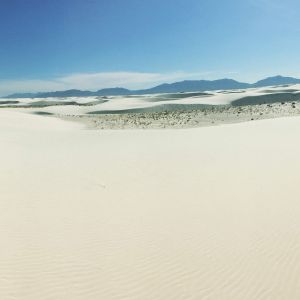
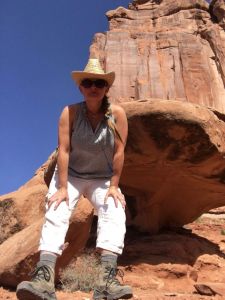
Thanks for the inspiration. I’m proud of you for taking that leap.
Thanks so much, Wendy!